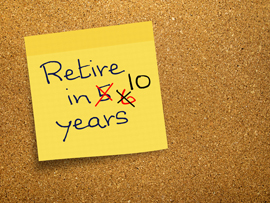When should I start taking my CPP?
You can start taking your CPP retirement pension at any age between 60 and 70. (You can start taking it after age 70, but there would be no reason to do that, and you would lose benefits.)
If you start taking your pension the month after you turn 65 years of age, you will get 100% of your benefit. If you start taking your pension before that age, it is reduced; after that age, it is increased. For example, in 2016, if you start taking your pension at age 60, it will be reduced by 36.0%. If you start taking it at age 70, it will be increased by 42%.
Here are some things to consider when deciding when to start taking your CPP retirement pension:
-
Do you need the money now?
If you are over 60 years of age and have few other source of income, you may want to start taking your CPP retirement pension early, even at the reduced rate. -
How long do you expect to live?
If you are in poor health, it may make sense to start collecting sooner rather than later. If you expect to live a very long life, delaying the start of your pension can result in thousands of dollars more in benefits over your lifetime. Note: If you are under age 65 and disabled to the point that you are incapable of working, you should consider applying for a CPP disability pension instead of an early retirement pension. -
Are you currently retired?
If you have stopped working and currently have fewer than 39 years of maximum CPP contributions, you may want to consider taking your CPP early. If you wait, your calculated retirement pension might decrease with each additional year of zero contributions, which will offset part of the increase that you receive by waiting. I refer to this situation as receiving a larger piece of a smaller pie. -
Do you have more than 39 years of maximum contributions to the CPP and are still working?
If so, any more CPP contributions will not increase the amount of your pension. If you are over 60 years of age and working, if you start collecting your CPP retirement pension, any further contributions will earn you Post-Retirement Benefits (PRBs). If you are over 65 and working, you can start collecting your CPP retirement pension and either opt to stop contributing or continue contributing and earn PRBs. -
Are you currently receiving a CPP survivor's pension?
If so, the "combined benefit" rules can significantly affect the breakeven age for waiting to start your own CPP retirement pension. Make sure that you fully understand the impact on your survivor's pension before you decide when to start your own retirement pension. -
Are you eligible for the Guaranteed Income Supplement (GIS)?
If so, delaying the start of your pension and thus increasing the amount may cause some of your GIS to be clawed back. -
What are the tax implications?
If you are still working and earning, your CPP will likely be more highly taxed now than later when you stop working. -
Do you have significant savings?
If you have saved a significant amount of money, for example, in an RRSP, you can spend down the RRSP and receive a higher amount of CPP at 65 or even 70. The CPP retirement pension is fully indexed to the cost of living (as measured by the Consumer Price Index). Some financial planners suggest it is best to delay taking the CPP to increase the amount and thereby maximize the effect of the indexing. -
Do you want to leave money to your children?
In that case, you may want to take the CPP early and preserve as much of your RRSP or other savings as possible to pass on to your children.
DR Pensions Consulting can provide accurate information about your CPP options, including the amounts you can expect to receive starting at a range of ages, and the corresponding lifetime benefits. Contact drpensions@shaw.ca.
